As I was watching Guardians of the Galaxy Vol. 2 yesterday, one thought kept running through my head:
Marvel movies have two problems when it comes to onscreen violence: tone and stakes.
This problem is actually most noticeable in Deadpool 2, but it first became obvious here.
Ironically, one of the Guardians’ recurring jokes about violence actually winds up costing the film some of its emotional impact. (Although, to be fair, they manged to slip it past the audience and still get the payoff they were looking for… but it could have worked even better than it did if they’d made one change.)
I’ll talk about that climactic “what if” in a second. But first, let’s look at the problem you get when a film’s violence gives the audience tonal whiplash.
Tell Me… Do You Bleed?
Is violence a good thing, a bad thing, or something to be laughed at?
In the original Marvel movie that established the MCU’s storytelling formula, 2008’s Iron Man, the answer was “almost always B.”
But in GOTG2, the answer seems to be “it depends on who that violence is happening to.”
Take the Ravagers, the group of space mercenaries led by Yondu.
In the first GOTG film, the Ravagers are shown to be mercenaries with a heart. They often behave heinously, but they’re also capable of heroism. They prove this by joining the Guardians and the Nova Corps to defend Xandar from being annihilated by Ronan the Accuser, a move that turns them into reluctant antiheroes and provides the audience with a welcome moment of “fuck yeah” catharsis.
Yet in GOTG2, while they’re still played primarily for laughs, they do so amid what should feel like very different emotional stakes.
The majority of Ravagers mutiny against Yondu when they feel he’s “gone soft”… which leads to them murdering their former crewmates by ejecting them into space.
Is this heartless? Absolutely. In fact, the film goes to great lengths to show just how horrible these space pirates are — including a sequence where they humiliate toddler Groot for their own amusement.
What’s the plot purpose of these scenes? To establish that Yondu, Groot, and Rocket need to escape from the Ravagers’ clutches before they’re killed.
What’s the emotional impact of these scenes? To build up our empathy for Yondu and Groot, and to make us worry about the peril that our heroes find themselves in.
But what’s the tonal impact of these scenes?
Well, here’s where it gets tricky.
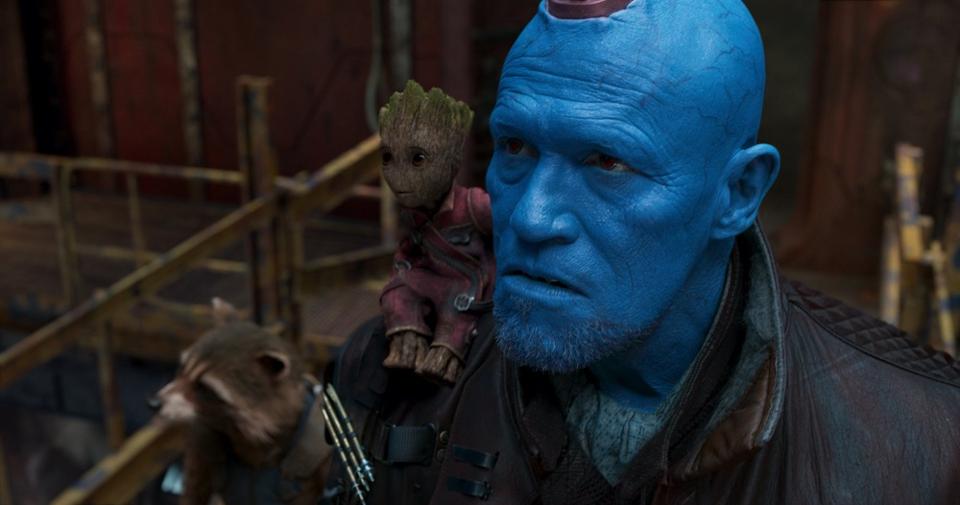
So big and so strong.
It Only Hurts When I Laugh
See, the big escape plan involves Yondu straight-up murdering every Ravager on his ship with the help of his trusty arrow.
This sequence is set to the offbeat, slow-motion swagger of “Come a Little Bit Closer,” a song that celebrates the romanticism of outlaws. It includes scenes of toddler Groot killing some of the pirates who humiliated him.
It’s also filmed as the “fun” midpoint of the film.
Nearly every death in this sequence is staged for either its cool factor (look how efficient and cold-hearted Yondu is!) or its LOL-worthy absurdity (haha! They DROPPED A SPACESHIP on them!).
The audience is expected to cheer for baby Groot giving these villains their just desserts, and for Yondu enacting his justified revenge.
The tonal result of this whole sequence is… we’re simply supposed to laugh because bad people got killed in a righteous and amusing fashion?
We’re supposed to view Yondu, Rocket, and toddler Groot as badass outlaws because they… murdered a bunch of other outlaws?
We’re supposed to cheer for the death and destruction of the very same characters whose deaths one movie ago would have been considered noble and tragic, but is now justified as being earned and deserved… right?
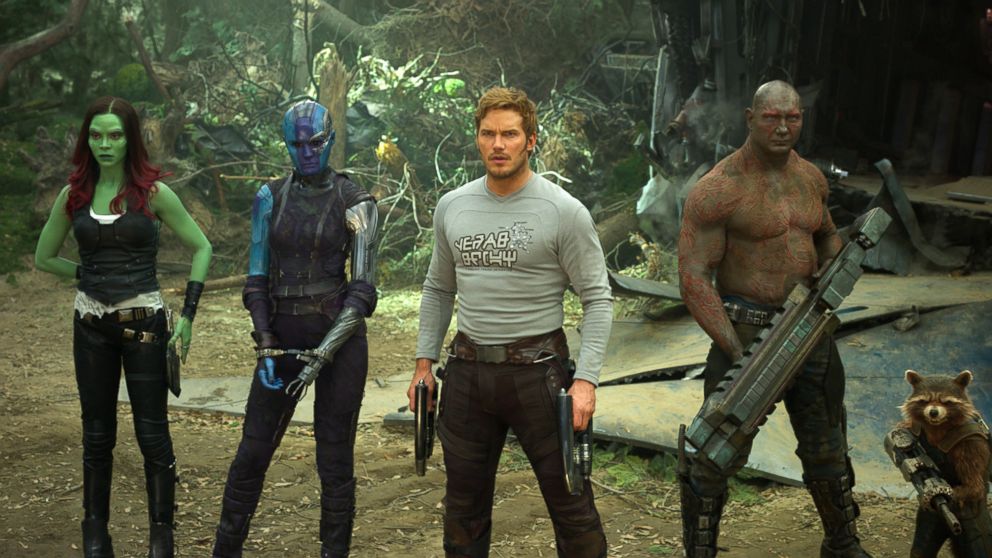
Heroes? Villains? Who’s to say?
The Sliding Scale of Marvel Movie Morality
For the sake of debate, consider if the first two Guardians movies reversed their plots.
What if Yondu’s crew had violently mutinied against him in the first movie (AKA been obvious villains), but then chosen to help defend Xandar against Ronan in the second movie (AKA been reluctant antiheroes)? I suspect we’d still cheer for their heel-to-hero arc… so why are we expected to not have empathy for those exact same characters now after they did the noble thing one movie earlier?
In other words, we’re not supposed to feel bad about any of those deaths. Rather, we’re supposed to be amused by and cheer for it…
And yet…
Just one MCU movie later, in Thor: Ragnarok, Hela kills all of the Valkyries, the Warriors Three, and a notable amount of Asgard’s population… and we are supposed to feel bad about that.
We’re not supposed to identify with Hela, even though her motivation — feeling cast out and rejected by a society she helped to make successful — is arguably an even more justifiable reason to seek revenge for a snub than Rocket’s is.
It seems like Marvel’s approach to onscreen violence is primarily for emotional manipulation or release, rather than as a legitimate plot point or an action to be seriously considered.
(And yeah, I know, I know: they’re just comic book movies. But they’re also some of the most-viewed films around the world right now, so I think their outsized impact on how people process humor, violence, and culture is worth analyzing.)
Speaking of which…
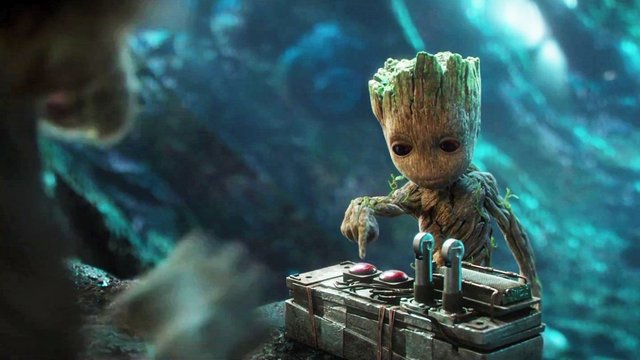
Here comes the other boom.
Gettin’ Twiggy with It
So, listen.
While we’re at it, can we talk about the fact that Groot is basically a giant adorable pacifist in the first Guardians film, and then he inexplicably becomes a murderous child in the second movie and everyone thinks that’s cute?
Not only does Groot’s characterization appear to be “whatever a joke requires it to be,” but it kind of undoes the entire emotional impact of the first movie, where Groot proved that sacrificing yourself to defend others is the greatest power.
(Good thing Yondu is here to… uh… teach us literally that exact same lesson, because every Marvel movie tells the same story anyway.)
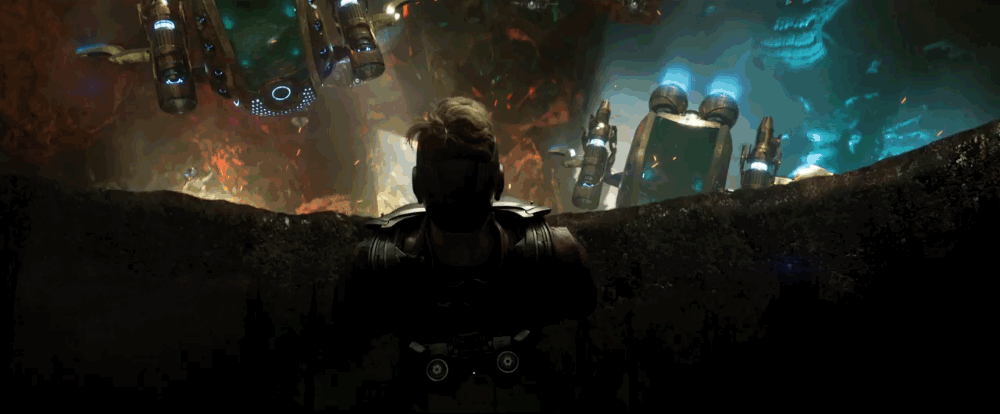
Ego trip.
Broken Tone = Broken Stakes
Okay, let’s step away from the somewhat subjective issue of how all this violence makes us feel.
Let’s talk about how it works practically within the narrative.
The film opens with (again) a massive slaughter played for laughs and set to fun music.
Crucially, despite the seeming appearance of mortal stakes and potentially catastrophic damage to the Guardians, none of them are injured. Not even close. This is our signal that the Guardians will essentially have impenetrable plot armor for the rest of the film.
True to that form, the Guardians are soon pursed into an asteroid belt in which Quill and Rocket effortlessly execute daredevil maneuvers that every pursuing ship fails to match. Once again: no need to worry about any of the main characters here.
Similarly, after we see Yondu slaughter an entire ship of pirates with his arrow…
And after Nebula chases Gamora down and can’t even scratch her with guns firing at point blank range…
And after the Guardians battle Ego in the film’s climax, and each of them survives getting pummeled, shot, smothered, crushed, and otherwise beaten to death by a living planet and none of them gets even minorly injured as a result, how worried are we ever supposed to be worried or emotionally invested in any conflict they find themselves in?
Now, granted, as proven in every other Marvel movie, we should never really be worried about any of the main characters. And, inherently, we know this.
But we at least want the characters’ survival to make sense.
And this is possibly GOTG2’s biggest issue, because most of the plot points in GOTG2 are solved by a Deus ex Machina… or, more accurately, a Deus ex Raccoon.
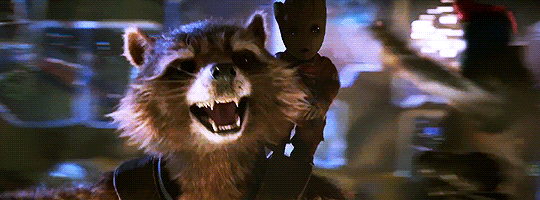
Calling him a trash panda is way worse.
There’s Always an Answer… Until There Isn’t
In order for an audience to feel emotionally invested in the stakes of a story, an audience has to understand three things:
- what a character wants
- what’s preventing them from achieving what they want
- the realistic limitations of the conflict
In other words, even in a story about magic or aliens, we have to understand what the magicians and aliens are or aren’t capable of in order to know what is and isn’t possible. If we’re not sure what someone’s abilities are, we’re not sure what constitutes an unsolvable problem or a life-or-death situation for them.
In the world of Guardians of the Galaxy, Rocket Raccoon makes this impossible.
Rocket is established as the tinkerer/inventor/demolition expert of the group, which means he has a seemingly infinite number of gadgets at his disposal that always seem to get them out of whatever situation they’re in… until it’s convenient for the plot for him to not have an answer.
The problem with this kind of “secret weapon” is that the audience gets trained to expect that Rocket always has an answer. We think that’s the norm, because his gadgets always make escape possible.
So when he doesn’t have an answer — as in the climax, when he somehow only has exactly enough gadgets to blow up Ego but not enough to save both Peter and Yondu — it doesn’t feel like an earned payoff; it feels like an excuse to generate an emotion that we would have felt even more deeply if we’d understood the stakes more clearly.
So, What Would Have Fixed These Flaws?
Without drastically changing the film’s plot, characterization, or sense of humor, here are three script choices that could have kept all of the nagging issues in Guardians of the Galaxy Vol. 2 from feeling so tonally and logically frustrating.
Let the Audience Clearly Understand Rocket’s Limitations
Add one scene (or, given storytelling’s reliance on the rule of threes, add three) where the contents of Rocket’s armory are clearly established. Maybe he has an overabundance of a gadget in one sequence, not enough of one in another, and more than enough of all the wrong items in the third.
Or, show him deciding what to pack when he’s escaping with Yondu.
Either way, the audience would have a pre-existing indication that Rocket may not have a way out of their climactic jam. If we know exactly how many lifesaving devices he has on him, even better.
Then, when he gives Yondu the bad news, it’ll feel earned rather than conveniently manipulative.
Give Us ANY Inkling That the Characters Are Conflicted About Death
Look, I get it: they’re mercenaries.
Maybe they all enjoy killing. Great. Have fun with it, if that’s your choice of tone.
But even if that’s the case, it would be helpful to see them conflicted about it, even once.
Especially Groot.
Show Us That These Characters AREN’T All Invulnerable
The cartoonish teen boy tone of Guardians of the Galaxy is its most defining trait.
But the less impact all the violence has on the characters, the lower the stakes — both logically and emotionally.
So let Drax get scratched up once in awhile.
Let Gamora pull a hamstring.
Hell, let Star-Lord at least need to catch his breath after being used as a human battery by a living planet.
Guardians of the Galaxy styles itself as a pop culture parable about the power of friendship to overcome pain, loneliness, and loss.
But if we never see these characters suffer, we can’t fully appreciate what their friendship is saving them from.
If You Liked This Post
Subscribe today and never miss a new post!
You may also like why Black Panther and Wakanda are the keys to Marvel’s future, or how to fix the storytelling flaws in Marvel’s Defenders.
Why Black Panther and Wakanda Are the Keys to Marvel’s Future
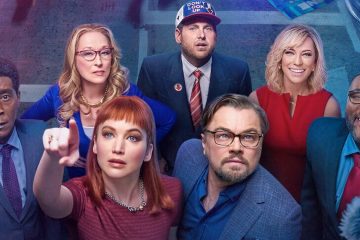
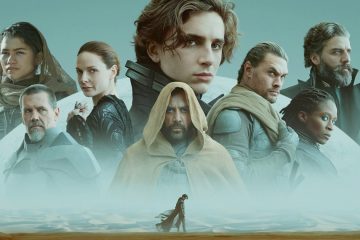
3 Comments
Jonny Gannett · June 2, 2018 at 9:16 am
Since when was Groot a pacifist in the first movie? He killed plenty of bad guys in it, and even tossed a few of them around beating the fuck out of them. If that’s what you call adorable pacifism then you and I have very different ideas of what pacifism is.
A lot of the criticism you levied against this film just feels stupid. When were the ravagers ever portrayed as anything less than villains? Cause I just watched the first one a few days ago. They were portrayed as space pirates who only did things for personal gain or because they were ordered to. This idea that they were ever someone noble is ludicrous. And that you’re actually genuinely asking why we don’t feel sorry for these clear scumbag villains and comparing the murder of Asgardians including heroes we grew to love by an OBVIOUSLY VILLAIN as if they should be viewed as the same thing is just baffling.
There’s such a big difference between when a villain is murdering innocent people, even going so far as to kill anyone who opposes her and kills heroes and ultimately brought about the destruction of the entire planet because Thor just couldn’t defeat her any other way. Hela is the main villain of the movie too. Of course, we’re not supposed to sympathize with her. Even if we think she has some points that are valid and understand why she’d be upset about being cast out by Odin that doesn’t excuse her evil actions. She ripped out the main characters fucking eye for fuck sakes. Comparing her to side character villains is laughable. It’s like comparing Thanos with the villains from the first Iron Man movie the 10 rings. Clearly not the main antagonists of the movie they were in but still obviously evil.
It’s not uncommon for people to not feel bad or sympathy when they see evil villains or characters die. Especially when it’s done in a humorous way. Why should we feel bad for them? None of the characters who were killed were people who showed a spec of humanity, or decency.
In fact, I think your entire premise is flawed. It’s far more likely the ones who were thrown out into space by the evil bearded guy Taserface were the “noble” ones from Guardians 1. They were the ones loyal to Yondu. Which is why they were killed, which is similar to what Hela did to people who were loyal to Thor or stepped out of line. Or for an example from a completely unrelated movie franchise Dawn Of The Planet Of The Apes. When the evil ape Koba who betrays Caesar locks up the apes who were loyal to Caesar.Even if Disney animated classics the movie villains often end up falling to their deaths or being killed in some way and generally we don’t feel bad for them.
The only time we can feel bad for a villain is when they’re a sympathetic villain. Think Green Goblin in Spider-man 2002. Or Killmonger from Black Panther. A villain needs to be sympathetic for us to care when they die. When it’s a bunch of scumbags why should anyone feel bad for their deaths or feel shitty for laughing at them when they’re portrayed so hilariously?
Justin · June 2, 2018 at 10:01 am
You’re right about Groot being violent as hell in the first movie, but he was also an adult then, and he was often in life-or-death situations. Seeing baby Groot lean in that direction while he’s still being portrayed as an adorable child is, from my POV, tonally questionable.
I think our difference in perspective re: the Ravagers, Hela, etc., comes down to “who deserves empathy?” I understand the functional need to create villains we’re not supposed to empathize with, because that lets the author murder them in ways we we’re supposed to enjoy because those villains aren’t really “worth” caring about. But I’m suspicious of stories that invite us to flip off our empathy switch, because that makes it easier for us to also do that in the real world.
Roman Cotton · December 20, 2021 at 6:34 pm
I found this article due to the realization that the movie was very inconsistent emotionally. I was interested to see if anyone on the internet had half a brain like me. I loved the ravengers in the 1st movie and everyone was cheering for them. Yes they were looking out for themselves but that doesnt mean there is not any nobility involved. Our admiration of them came hand to hand with Peter as he was a representation of the potential in almost anyone. This article is spot on in alot of matters.